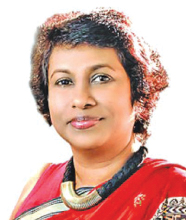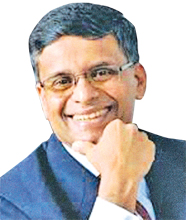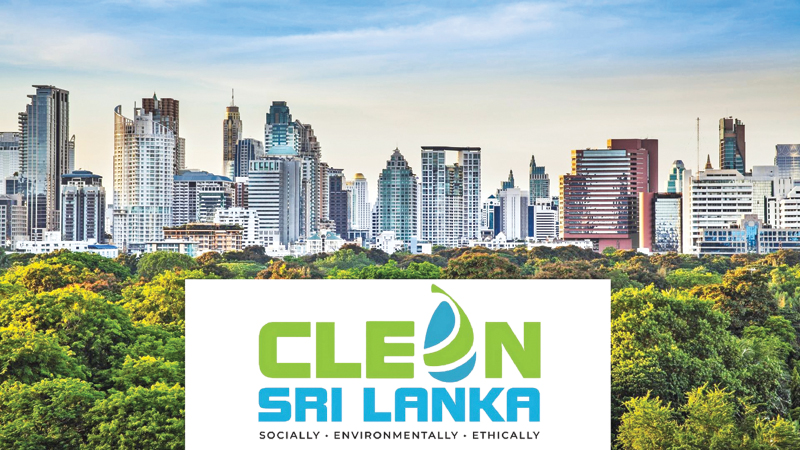 On January 1, 2025, President Anura Kumara Dissanayake launched the “Clean Sri Lanka” program designed to pave the way towards a transformation that embodies the vision of “A Thriving Nation A Beautiful Life”. The initiative focuses on four primary goals such as, the eradication of rural poverty, environmental clean-up, building a digital economy and ensuring good governance. These objectives, however, cannot lead to the transformative change that Sri Lanka needs unless the detrimental elements within society, such as clientelism, nepotism, fraud, corruption, bribery, wastefulness, misuse and mismanagement of resources are decisively addressed.
On January 1, 2025, President Anura Kumara Dissanayake launched the “Clean Sri Lanka” program designed to pave the way towards a transformation that embodies the vision of “A Thriving Nation A Beautiful Life”. The initiative focuses on four primary goals such as, the eradication of rural poverty, environmental clean-up, building a digital economy and ensuring good governance. These objectives, however, cannot lead to the transformative change that Sri Lanka needs unless the detrimental elements within society, such as clientelism, nepotism, fraud, corruption, bribery, wastefulness, misuse and mismanagement of resources are decisively addressed.
At the core of this ambitious undertaking is the Clean Sri Lanka (CSL) Task Force, made up of an 18-member team appointed by President Anura Kumara Dissanayake comprising experts and stakeholders from various sectors.
Dr. S.N. Kumanayaka (Secretary to the President), Army, Navy and Air Force Commanders, W. L. A. Saman Priyantha (Acting IGP), Kumudhu Lal de Silva (Chairman, Urban Development Authority), S. Jayaratne, Gihan de Silva, Sandhya Salgado, Dr. Gamini Batuvitage, Dr. Anuruddha Gamage, Dilruk Wanasinghe, Deepal Sooriyaarachchi, Sisira Amara Bandhu, Krishantha Koorey, Jayathu Perera, Ruwan Weerasuriya and Dayan Karunaratne are the Task Force members.
The Sunday Observer interviewed two members of the Task Force, Sandya Salgado and Deepal Sooriyaarachchi who discussed the comprehensive feasibility studies and action plan currently in place to drive this initiative forward. Their insights reveal a commitment not only to improving Sri Lanka’s immediate social and environmental challenges but also to fostering an environment that supports sustainable development and moral integrity.
Task Force

Sandya Salgado

Deepal Sooriyaarachchi
“We have been actively working on this concept for the past few months. Being formally recognised by the President has made our task easier. Our role is to identify, stimulate, promote and facilitate initiatives,” said Sooriyaarachchi. The selection process for the Task Force happened organically. According to Salgado, “Most of the members have come together voluntarily to develop the framework and administrative processes that will make Clean Sri Lanka a sustainable program.”
The Task Force is dedicated to promoting positive societal qualities, emphasising civic consciousness and consideration for one another. As Sooriyaarachchi said, the key focus areas of this initiative include making roads safer for everyone, ensuring that public spaces are clean and accessible and fostering a friendly and courteous attitude towards tourists, treating them as valued guests.
As we all know from everyday experience, our country has paid little attention to road safety, particularly public transport which has become a nightmare for many. This project aims to take immediate measures to monitor and implement rules and methods to enhance road safety, cleanliness and create a people-friendly environment.
“Road safety begins with the quality of drivers, vehicles and the state of the roads. We will engage various stakeholders, including the Department of Motor Traffic, the Road Development Authority, the Police Department and more to address these issues comprehensively.”
Recognising the importance of instilling values in the youth, the Task Force is committed to working closely with the education system. “Children imitate adults,” Salgado said. Thus, they plan to promote and recognise the 5S methodology in schools, starting from early childhood development. “The initiative seeks to instill the dignity of labour from childhood while encouraging practices such as the 5S methodology to enhance orderliness and productivity,” Salgado said.
The Task Force is committed to creating disability-friendly public spaces and ensuring the availability of high-quality public restrooms throughout the country. Streamlining garbage disposal, protecting water resources sustainably and fostering a culture of reduce, reuse and recycle are also essential components of the program. Salgado said this multi-faceted approach strengthens public resistance to corruption and exemplifies interconnectedness and interdependence of the social, environmental and ethical dimensions of society.
To ensure the sustainability and effectiveness of the “Clean Sri Lanka” initiative, ambitious long-term measurable goals have been set up, focusing on various environmental and social indicators. The initiative aims for a year-on-year improvement in air quality across major cities, alongside comprehensive assessment of water quality for all significant water resources.
“We cannot underestimate the urgency of addressing our environmental challenges,” said Salgado, emphasising the need for proactive measures. “Our goal is to increase forest cover over a specified period and achieve over 90 percent recycling of all recyclable materials, with clear metrics for different items. This is not just about numbers; it’s about cultivating a sustainable mindset in our communities.”
Aiming to reduce the carbon footprint by 2030, the initiative strives to meet cleanliness, accessibility and safety standards across all public spaces within municipal areas. The goal is to reduce road accidents by 80 percent over the next three years and decrease the incidence of diseases such as dengue, which are closely linked to poor environmental conditions.
“In educational institutions, the full adoption of the 5S methodology in all public schools, as well as its complete implementation in public offices, will be fundamental to our strategy. We need to instill a culture of orderliness and productivity from an early age.” Sooriyaarachchi said.
The initiative also prioritises visual orderliness as stipulated by urban planners while ensuring that high-quality public restrooms are available in all towns and major transportation hubs. Food safety is another focus, with plans to issue acceptable quality standard grading for every food outlet, thereby fostering trust and accountability among consumers.
Paper usage
“We are committed to reducing paper usage in public sector institutions by 50 percent within three years and halving usage among public sector vehicles. This is a holistic approach to sustainability.” added Salgado. Moreover, the initiative aims to maintain 100 percent cleanliness on beaches, ensuring they remain free from waste left by users. Improving public perception of transparency is also a crucial objective, alongside meeting Best Cities indices for all major cities. “When we work together to eradicate vandalism of public property and achieve zero instances of bribery and corruption involving public officials above officer grade, we transform our society,” Sooriyaarachchi said. Finally, the initiative aims to reduce overall waste generation by 25 percent within five years, reinforcing the commitment to environmental stewardship.
“While there is already a strong legal framework to curb corruption, we need to de-bureaucratise processes to make them more transparent and user-friendly. This means removing unnecessary complexities that hinder effective governance and make it challenging for citizens to engage with public institutions.” Salgado said.
Digitalisation will be one avenue through which we can recognise institutions that simplify their processes and uphold integrity. By leveraging technology, it can streamline bureaucratic procedures, allowing citizens to access services more easily and efficiently. Implementing digital platforms for reporting issues, tracking public services, and ensuring accountability creates an environment where transparency is prioritised.
“In this digital age, it’s essential that we harness the power of technology to fortify our governance systems. When processes are clear and accessible, it empowers citizens to hold their leaders accountable, fostering trust between the public and institutions. Our goal is to create an ecosystem where ethical practices thrive and corruption has no place,” Sooriyaarachchi added.
To achieve these ambitious goals, the Task Force hopes to engage multiple stakeholders, from Government entities to private sector organisations, to develop and implement sustainable solutions. Sooriyaarachchi said, “The Sri Lankan citizen will make this happen. We will support and facilitate only. Change has to start with the individual, from the home to the neighbourhood and finally, to the country.”
He also said that “When a country is at the cusp of change, it is the best time to reset its processes. If we don’t make our country cleaner and safer, we cannot expect to develop tourism or engage all sectors of society.”
As Sri Lanka emerges from a period of economic bankruptcy, securing adequate resources is a critical concern for the Clean Sri Lanka initiative. The Task Force plans to work closely with existing partners and actively encourage contributions from the Sri Lankan Diaspora. “Most of our activities will focus on facilitating, stimulating, and coordinating efforts, which do not require significant financial investment. Nearly every member of the Task Force is volunteering their time and expertise,” said Salgado.
She said that the Clean Sri Lanka is a project for every citizen, underlining that each person has a role to play in its success. “Every citizen of the country has tasks to fulfill. Our role is to facilitate, implement necessary actions, identify areas that need attention, advocate for new laws and regulations, and direct these initiatives to the appropriate institutions and agencies,” Salgado added.
By addressing bottlenecks, the Task Force aims to maximise the potential of ongoing initiatives, fostering a collaborative environment among volunteers and stakeholders. Recognising the vital importance of community involvement, the initiative is open to all interested citizens.
Those who wish to contribute can express their expertise and interest through the Clean Sri Lanka website, app, hotline, or email address.
Salgado reinforced the urgency of public participation, saying, “We will need many volunteers as we progress, and Clean Sri Lanka has to be a project that involves each and every citizen of the country.”
Clean Sri Lanka
To further support these activities, the Task Force is setting up the Clean Sri Lanka Fund. This fund will be unique as it allows donors to track how their contributions are used transparently, governed by a special panel and subject to Government audits.
“The role of the media is crucial for the success of this project and we believe the media can use their creativity to promote the ideas of Clean Sri Lanka, instead of merely reporting on the activities,” Salgado added.
To engage the public effectively, the Task Force intends to utilise every possible channel, from Government structures to religious establishments. They view all sectors as partners in this national movement. “This is not just a project; this is a national initiative and movement,” Sooriyaarachchi said.
When asked how soon results could be seen, Sooriyaarachchi added, “As soon as the people embrace the concept and act upon it. While we believe this is a long-term initiative, with momentum, it will be embraced by all sectors of society.”
As the Clean Sri Lanka initiative gains traction, the Task Force calls upon every citizen to embrace this vision of a cleaner, safer, and more ethical nation. Sooriyaarachchi concluded with a motivating note, “This is not just a task for a few, it is a national movement that will require the commitment and participation of every Sri Lankan. We have very little time to address the social impairments that have affected us over the years. The need to get started is now.”
With determination and a collaborative spirit, the Clean Sri Lanka initiative stands poised to inspire transformative change, demonstrating that together, citizens can reshape the country for the better. The movement embodies a collective hope for a sustainable future, reflecting the values and aspirations of Sri Lankans.






